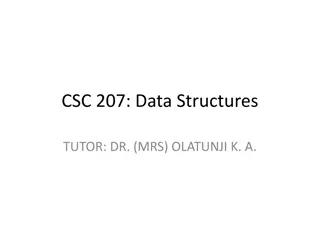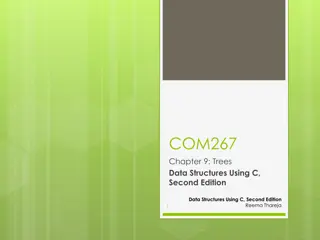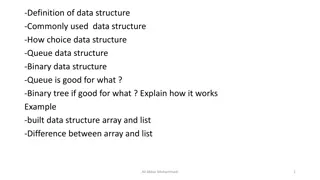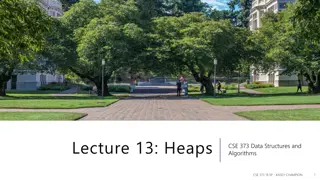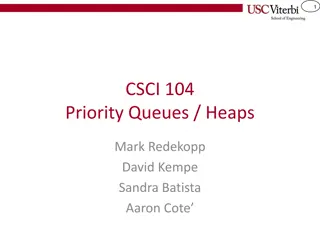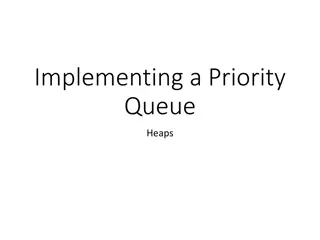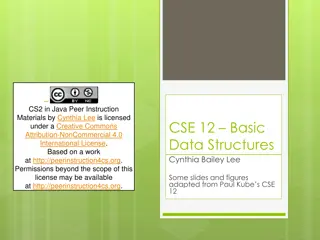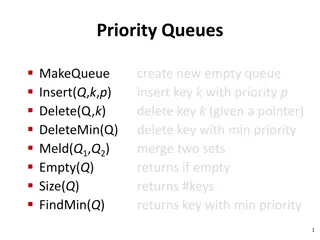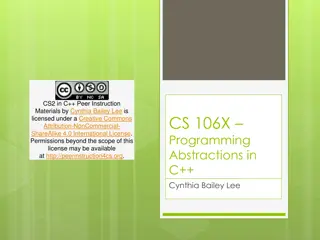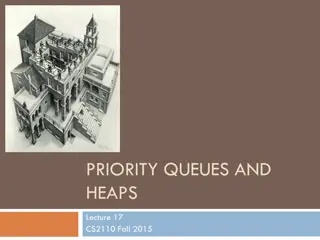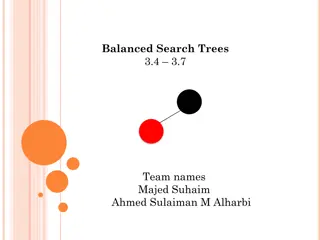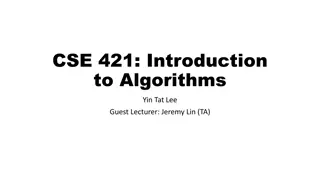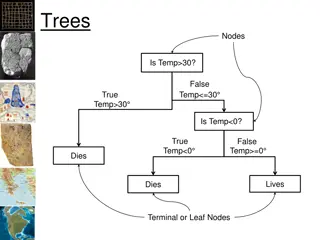Understanding Priority Queues and B-Trees in Data Structures
Explore the concepts of priority queues and B-Trees, including rigorous problem-solving in homework assignments. Discover the key elements of B-Trees, their implementation, and benefits. Gain insights into memory architecture considerations and the importance of properly aligning nodes. Learn about the significance of M and L values, performance analysis, and insertion techniques. Conclude with the advantages of B-Trees in managing data efficiently across memory and disk storage.
Download Presentation

Please find below an Image/Link to download the presentation.
The content on the website is provided AS IS for your information and personal use only. It may not be sold, licensed, or shared on other websites without obtaining consent from the author. Download presentation by click this link. If you encounter any issues during the download, it is possible that the publisher has removed the file from their server.
E N D
Presentation Transcript
CSE 373 OCTOBER 27TH PRIORITY QUEUES
TODAY HW 2 grades went out yesterday Many of the problems seemed to be a problem with rigor In proofs, justify what you re saying and make as much explicit as you can
TODAY HW 2 grades went out yesterday Many of the problems seemed to be a problem with rigor In proofs, justify what you re saying and make as much explicit as you can https://catalyst.uw.edu/webq/survey/ejmcc/34086 3
TODAY B+-Trees Conclusion and important info New ADT Priority Queue
B-TREE EXAMPLE Let M (the number of children from a signpost) be 3 and let L (the number of k,v pairs in a leaf) be 1 This is a 3-1 tree (uncommon, but useful for demonstration).
B-TREES B-Trees do not receive a benefit unless their nodes are page aligned If the nodes overlap a page boundary, we are doubling the number of potential disk accesses
B-TREES B-Trees do not receive a benefit unless their nodes are page aligned If the nodes overlap a page boundary, we are doubling the number of potential disk accesses Because of this, B-trees are not implemented in Java.
B-TREES Designed based on our knowledge of memory architecture If a disk access brings a whole page into memory (or cache), make sure that we get the maximum amount of information. When we bring in a signpost, we can use fast in-memory binary search to find the correct child
B-TREES Important things to remember Signposts v. Leaves Performing a find Runtime analysis Inserting in simple cases Calculating M and L
B-TREE Conclusion
B-TREE Conclusion Good data structure for working with and understanding memory and the disk
B-TREE Conclusion Good data structure for working with and understanding memory and the disk More complicated analysis, but comes after recognizing that bigO assumes equal memory access
B-TREE Conclusion Good data structure for working with and understanding memory and the disk More complicated analysis, but comes after recognizing that bigO assumes equal memory access Computer architecture constraints have real- world impacts that can be corrected for
B-TREE Conclusion Good data structure for working with and understanding memory and the disk More complicated analysis, but comes after recognizing that bigO assumes equal memory access Computer architecture constraints have real- world impacts that can be corrected for Theory is great, but it has its limitations
PRIORITY QUEUE New ADT
PRIORITY QUEUE New ADT Objects in the priority queue have: Data Priority
PRIORITY QUEUE New ADT Objects in the priority queue have: Data Priority Conditions Lower priority items should dequeue first Should be able to change priority of an item FIFO for equal priority?
PRIORITY QUEUE insert(K key, int priority) Insert the key into the PQ with given priority findMin() Return the key that currently has lowest priority in the PQ (min-heap) deleteMin() Return and remove the key with lowest priority changePriority(K key, int newPri) Assign a new priority to the object key
PRIORITY QUEUE Applications?
PRIORITY QUEUE Applications? Hospitals CSE course overloads Etc
PRIORITY QUEUE How to implement?
PRIORITY QUEUE How to implement? Array?
PRIORITY QUEUE How to implement? Array? Must keep sorted Inserting into the middle is costly (must move other items)
PRIORITY QUEUE How to implement? Keep data sorted (somehow) Array? Inserting into the middle is costly (must move other items) Linked list? Must iterate through entire list to find place Cannot move backward if priority changes
PRIORITY QUEUE These data structures will all give us the behavior we want as far as the ADT, but they may be poor design decisions Any other data structures to try?
PRIORITY QUEUE Priority queue implementations?
PRIORITY QUEUE Priority queue implementations? Binary search tree?
PRIORITY QUEUE Priority queue implementations? Binary search tree? Faster insert
PRIORITY QUEUE Priority queue implementations? Binary search tree? Faster insert Find? Always deleting the smallest (left- most) element
PRIORITY QUEUE Priority queue implementations? Binary search tree? Faster insert Find? Always deleting the smallest (left- most) element Changing priority?
PRIORITY QUEUE Want the speed of trees (but not BST) Priority Queue has unique demands
PRIORITY QUEUE Want the speed of trees (but not BST) Priority Queue has unique demands Other types of trees?
PRIORITY QUEUE Want the speed of trees (but not BST) Priority Queue has unique demands Other types of trees? Review BST first
PROPERTIES (BST) Tree
PROPERTIES (BST) Tree (Binary) Root (Two) Children No cycles
PROPERTIES (BST) Tree (Binary) Root (Two) Children No cycles Search
PROPERTIES (BST) Tree (Binary) Root (Two) Children No cycles Search Comparable data Left child data < parent data
PROPERTIES (BST) Tree (Binary) Root (Two) Children No cycles Search Comparable data Left child data < parent data Smallest child is at the left most node
PROPERTIES (BST) Binary tree may be useful Search property doesn t help
PROPERTIES (BST) Binary tree may be useful Search property doesn t help Always deleting min
PROPERTIES (BST) Binary tree may be useful Search property doesn t help Always deleting min Put min on top!
HEAP-ORDER PROPERTY Still a binary tree
HEAP-ORDER PROPERTY Still a binary tree Instead of search (left < parent),
HEAP-ORDER PROPERTY Still a binary tree Instead of search (left < parent), parent should be less than children
HEAP-ORDER PROPERTY Still a binary tree Instead of search (left < parent), parent should be less than children How to implement? Insert and delete are different than BST
HEAP-ORDER PROPERTY Still a binary tree Instead of search (left < parent), parent should be less than children How to implement? Insert and delete are different than BST
HEAPS The Priority Queue is the ADT The Heap is the Data Structure
HEAP EXAMPLE Only looking at priorities Insert something priority 4
HEAP EXAMPLE 4 Now insert priority 6?


